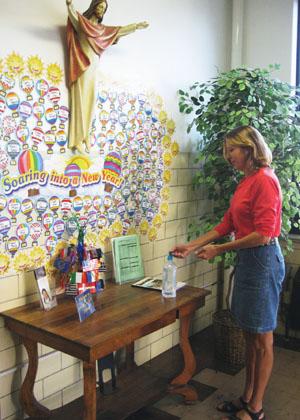
By Anne Marie Amacher
While an outbreak of the seasonal flu or the new H1N1 virus hasn’t occurred yet in the Diocese of Davenport, entities across the diocese are preparing for an outbreak of the seasonal flu and/or H1N1 virus.
The diocese recently revised its “Policies Relating to Planning for Pandemic Influenza (and other Influenza Outbreaks)” and has posted it on the diocesan Web site at www.davenportdiocese.org.
Deacon Frank Agnoli, director of liturgy who led the policy’s revisions, said one of the changes deals with an emphasis on diocesan response to outbreaks. The old policy followed the World Health Organization (WHO) phases for assessing outbreaks.
“The H1N1 virus didn’t follow the rules. The outbreak was ahead of WHO,” he said.
The revised policy focuses on local events versus the international ranking, but WHO phases will still be referenced.
Overall, changes in the new policy reflect adjustments and fine tuning. It has been updated with information about H1N1.
Also addressed are guidelines for parishes, schools, religious education programs and other entities as the threat level for a pandemic flu increases and regresses, he said.
The policy encourages prevention, which is a key to stopping or slowing the spread of seasonal flu, H1N1 and other illnesses. Preventive measures include hand washing and sneezing or coughing into a tissue or the crook of one’s arm — not into the hand.
At St. Ambrose University in Davenport, a Health and Safety Committee was formed last March. It monitors the threat level on campus and beyond on a daily basis. The university works with and follows guidelines from the diocese, Scott County Public Health Department, Iowa Department of Public Health, Centers for Disease Control and WHO.
“We have done a lot to educate,” said Jane Kettering, the university’s director of media relations.
“We have a Web page dedicated to H1N1. We have e-mailed all of our students, sent a letter home to parents, hung posters and added more hand sanitizer stations on campus.”
No cases have been reported on campus. If that happens, the affected student would be asked to return home when possible. Long-distance students would be asked to stay in their rooms on campus. The resident assistant and health services personnel would check in with the students and bring meals.
“We encourage self-isolation, but we will check on them frequently,” Kettering said.
The school also will make reasonable accommodations so students can keep up on classes.
“The CDC advises schools not to close unless there is a significant outbreak,” Kettering noted.
Most, if not all, Catholic schools in the diocese have hand sanitizer units. Many have them in all classrooms while other schools have several stations throughout buildings.
At Holy Trinity Catholic Schools in Lee County, school officials attended a school planning meeting Aug. 26 with the Lee County Health Department, said Shelley Sheerin, Holy Trinity’s communications coordinator.
Each building has established the cleaning protocol suggested by the Lee County Health Department and will participate in the school immunization program when it becomes available. Automatic soap dispensers were installed last year, along with posters demonstrating proper hand-washing techniques.
Sheerin said desks, chairs, door knobs, computer keyboards and “basically everything a student touches” is sprayed with a bleach-water solution between class periods.
The school Web site has a link to the Iowa Department of Public Health guidelines.
Seton Catholic School in Ottumwa has been working with health officials and focusing on the idea, “An ounce of prevention is worth a pound of cure,” said Principal Terri Schofield.
Informational handouts about the flu are being sent to parents. A hand sanitizer is located at the entry of the school and all visitors are encouraged to use it. Each morning when the students arrive in their classroom they wash or disinfect their hands and are reminded to do so often throughout the day.
A schedule in each classroom reminds teachers to wash off students’ desks once during school hours and again at the end of the day, as well as the door knobs and light switch. Periodically throughout the day, water fountains are sanitized as well as stair railings. After each class in the art room, the tables are cleaned, as well as in the computer lab.
“We are using this experience to teach the students of those practices that will assist them to lead a healthier lifestyle,” Schofield said.
At St. Paul the Apostle Catholic School in Davenport, parent volunteer Wendy Munoz, RN, will provide training about hand hygiene with each class from preschool through eighth grade, said Principal Julie Delaney.
“We are sending home educational information about H1N1 and prevention measures to parents as new information becomes available as part of our Wednesday parent communications,” Delaney said. Students will have the option to receive flu vaccinations provided by Genesis VNA with parental permission, and possibly the H1N1 vaccine option.
At Notre Dame Elementary School in Burlington, automatic soap dispensers are in the restrooms, said Principal Bob Carr. The Home and School Association is raising funds to install hand sanitizer dispensers in every classroom and other locations in the building. Information from the Department of Health and Human Services and other sources on prevention is being reviewed for distribution to staff and parents.
Lourdes Catholic School in Bettendorf plans to educate teachers, students and parents about proper hand washing techniques and to provide information about flu symptoms and response. The school also plans to participate in a free flu shot program for students, said Principal Katie Selden. The school has masks, extra sanitation items and ear probe covers for thermometers. A plan for isolation areas for ill children also has been established.
At Regina Elementary in Iowa City, the school emphasizes hand washing and has H1N1 posters in the rooms explaining how to prevent the spread of the virus, said Principal Celeste Vincent.








